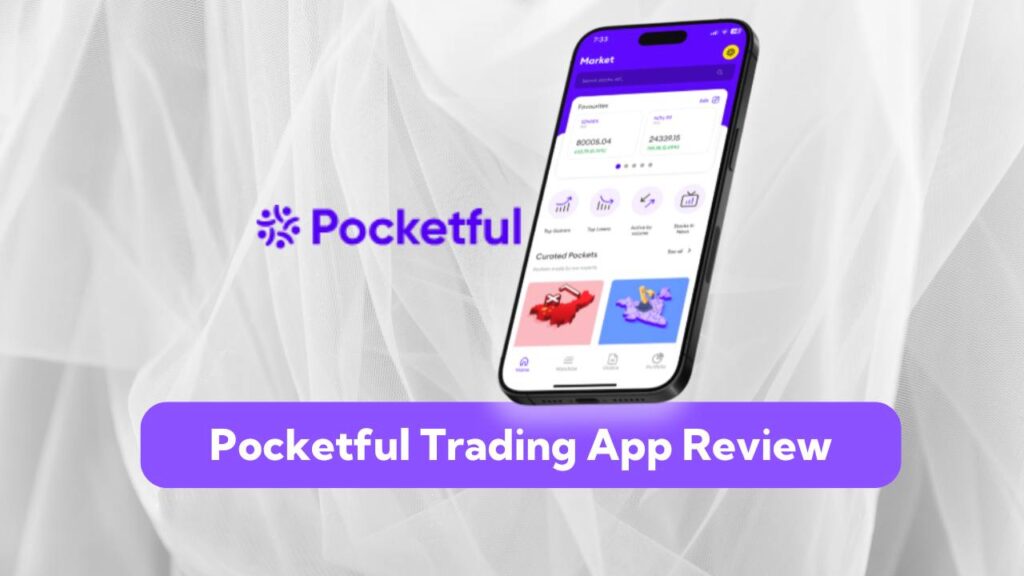
The Pocketful trading app is a rising star in the Indian stock trading space, offering advanced tools and cost-effective solutions for traders. Whether you are an experienced trader or a novice exploring the world of investing, Pocketful aims to provide a seamless trading experience. This review delves into the platform’s features, pricing, advantages, drawbacks, and alternatives, while addressing common questions to help you make an informed decision.
Key Features of Pocketful
1. Advanced Trading Tools
Pocketful caters to options, algo, and swing traders by providing:
- Advanced Option Chain: Helps traders analyze and execute option strategies efficiently.
- Strategy Builder: Customizable tools to create and backtest trading strategies.
- Order Slicing: Breaks down large orders for better execution and reduced impact costs.
2. Competitive Pricing
Pocketful stands out with its flat pricing structure. Traders can execute orders at just ₹20 per transaction, ensuring cost-efficiency.
3. User-Friendly Platform
The interface is designed to be intuitive, making it easy for beginners to navigate while providing advanced features for seasoned traders.
4. API Integration
Developers and algo traders can leverage Pocketful’s API to automate and customize their trading experience.
5. Diverse Asset Classes
The platform supports trading across various asset classes including equities, commodities, and derivatives, allowing users to diversify their portfolios conveniently.
Detailed Pricing Structure
Pocketful’s pricing model is straightforward, making it an attractive choice for traders. Here’s a breakdown:
- ₹20 per Order for Intraday and F&O Trades: A flat fee irrespective of the order size.
- ₹0 Delivery Charges: Long-term investors can execute delivery trades without incurring brokerage fees.
- No Account Opening Fees: Setting up a demat account with Pocketful is completely free.
- No Annual Maintenance Charges (AMC): Users save on maintenance fees, reducing the overall cost of investing.
When compared to other brokers, Pocketful’s pricing is competitive, especially for active traders looking to minimize costs.
Pros of Using Pocketful
1. Cost-Effective Trading
Pocketful’s flat fee structure ensures traders keep a larger share of their profits. With zero delivery charges, it’s also ideal for long-term investors.
2. Comprehensive Tools
The platform’s suite of tools, such as the advanced option chain and strategy builder, enhances decision-making for traders.
3. Developer-Friendly APIs
Pocketful’s API offerings make it a preferred choice for algorithmic traders who wish to automate their strategies.
4. Diverse Asset Availability
With the ability to trade in equities, commodities, and derivatives, users can build well-rounded portfolios.
5. Seamless User Experience
The app’s design prioritizes ease of use, making it accessible to traders of all experience levels.
Cons of Using Pocketful
1. Limited Physical Presence
Pocketful operates primarily online, which might be a drawback for users who prefer in-person support or branch visits.
2. Limited Educational Resources
While the platform offers advanced tools, it lacks comprehensive educational content, which could be a barrier for beginners.
Alternatives to Pocketful
1. Zerodha
- Strengths: A market leader in discount broking, Zerodha is known for its intuitive interface and comprehensive educational resources.
- Ideal For: Beginners and experienced traders looking for a well-rounded platform.
2. Upstox
- Strengths: Competitive brokerage rates and robust trading tools.
- Ideal For: Traders seeking a cost-effective platform with a modern app interface.
3. Angel One
- Strengths: Offers strong research and advisory services along with a wide range of investment options.
- Ideal For: Investors who value research-driven insights.
4. Groww
- Strengths: Simplified interface, especially appealing to millennials and first-time investors.
- Ideal For: New investors looking for a straightforward platform.
Conclusion
Pocketful is a promising trading platform that combines advanced features, cost-effective pricing, and user-friendly design. While its limited physical presence and relatively new status may raise questions, its strengths in technology and affordability make it a compelling choice for traders. Alternatives like Zerodha and Upstox provide strong competition, but Pocketful’s focus on innovation and affordability sets it apart.
If you are a trader seeking a modern, cost-efficient platform, Pocketful is worth exploring. Its advanced tools, seamless API integration, and flat pricing model cater to both novice and seasoned traders. However, new investors may need supplementary educational resources to make the most of the platform.
Frequently Asked Questions (FAQs)
1. Is Pocketful regulated?
Yes, Pocketful is a SEBI-registered stockbroker and a member of NSE, BSE, and MCX, ensuring compliance with industry regulations.
2. What are the account opening requirements?
Opening an account is quick and free. Users need to provide basic KYC documents such as PAN and Aadhaar for verification.
3. Does Pocketful offer a mobile app?
Yes, the Pocketful mobile app is available for both Android and iOS, enabling users to trade on-the-go.
4. Are there educational resources available?
While Pocketful focuses on tools, users may need to seek external platforms for comprehensive educational content.
5. How does Pocketful ensure security?
The platform employs industry-standard security measures, including two-factor authentication and data encryption, to protect user information.
